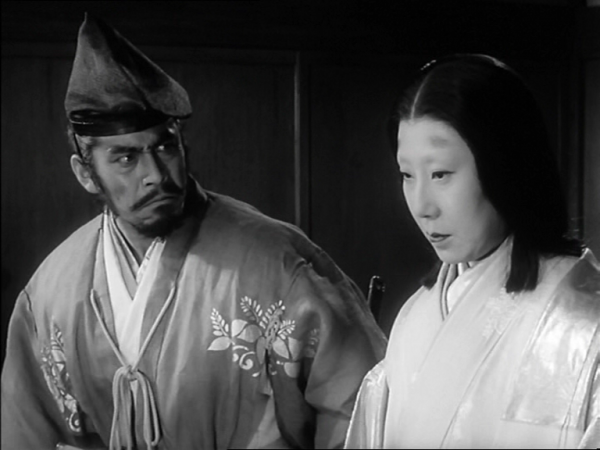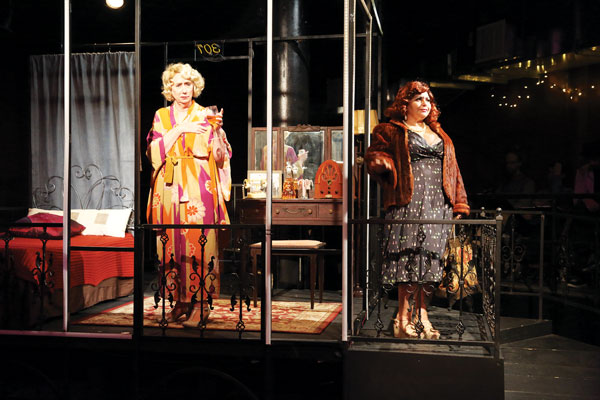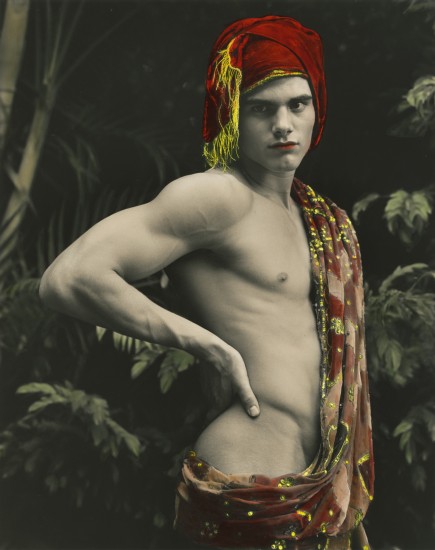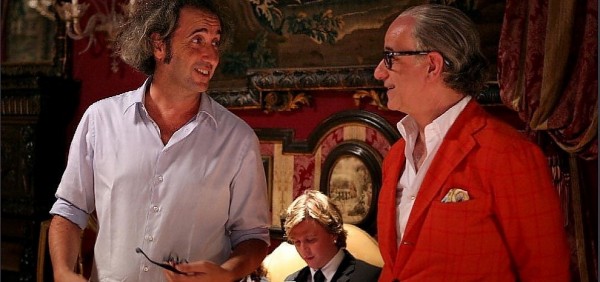
Washizu (Toshirô Mifune) and his wife, Asaji (Isuzu Yamada), reimagine Shakespeare’s MACBETH in Kursosawa classic THRONE OF BLOOD
THRONE OF BLOOD, AKA MACBETH (KUMONOSU JÔ) (Akira Kurosawa, 1957)
Anthology Film Archives
32 Second Ave. at Second St.
Thursday, November 21, 9:15; Sunday, November 24, 3:45; and Sunday, December 1, 5:30
Series runs November 20 – December 1
212-505-5181
www.anthologyfilmarchives.org
 Akira Kurosawa’s marvelous reimagining of Macbeth is an intense psychological thriller that follows one man’s descent into madness. Following a stunning military victory led by Washizu (Toshirô Mifune) and Miki (Minoru Chiaki), the two men are rewarded with lofty new positions. As Washizu’s wife, Asaji (Isuzu Yamada, with spectacular eyebrows), fills her husband’s head with crazy paranoia, Washizu is haunted by predictions made by a ghostly evil spirit in the Cobweb Forest, leading to one of the all-time classic finales. Featuring exterior scenes bathed in mysterious fog, cinematographer Asakazu Nakai’s interior long shots of Washizu and Asaji in a large, sparse room carefully considering their next bold move, and composer Masaru Sato’s shrieking Japanese flutes, Throne of Blood is a chilling drama of corruptive power and blind ambition, one of the greatest adaptations of Shakespeare ever put on film Throne of Blood is screening November 21, November 24, and December 1 as part of the Anthology Film Archives series “The Middle Ages on Film: Shakespeare,” consisting of ten cinematic adaptations of several of the Bard’s history plays, set in the Middle Ages, including Laurence Olivier’s Henry V, Roman Polanski’s Macbeth, Orson Welles’s Chimes at Midnight, and Peter Brook’s King Lear. The twelve-day festival was curated in collaboration with professor and scholar Martha Driver, who notes, “Through film, Shakespeare’s Middle Ages are not lost but revived and revitalized in translation. And much of what we think we know about the medieval period has been shaped by Shakespeare, the plays and film adaptations living on in our memories more vividly perhaps than the history books’ accounts.”
Akira Kurosawa’s marvelous reimagining of Macbeth is an intense psychological thriller that follows one man’s descent into madness. Following a stunning military victory led by Washizu (Toshirô Mifune) and Miki (Minoru Chiaki), the two men are rewarded with lofty new positions. As Washizu’s wife, Asaji (Isuzu Yamada, with spectacular eyebrows), fills her husband’s head with crazy paranoia, Washizu is haunted by predictions made by a ghostly evil spirit in the Cobweb Forest, leading to one of the all-time classic finales. Featuring exterior scenes bathed in mysterious fog, cinematographer Asakazu Nakai’s interior long shots of Washizu and Asaji in a large, sparse room carefully considering their next bold move, and composer Masaru Sato’s shrieking Japanese flutes, Throne of Blood is a chilling drama of corruptive power and blind ambition, one of the greatest adaptations of Shakespeare ever put on film Throne of Blood is screening November 21, November 24, and December 1 as part of the Anthology Film Archives series “The Middle Ages on Film: Shakespeare,” consisting of ten cinematic adaptations of several of the Bard’s history plays, set in the Middle Ages, including Laurence Olivier’s Henry V, Roman Polanski’s Macbeth, Orson Welles’s Chimes at Midnight, and Peter Brook’s King Lear. The twelve-day festival was curated in collaboration with professor and scholar Martha Driver, who notes, “Through film, Shakespeare’s Middle Ages are not lost but revived and revitalized in translation. And much of what we think we know about the medieval period has been shaped by Shakespeare, the plays and film adaptations living on in our memories more vividly perhaps than the history books’ accounts.”





 Fashion photographer Bruce Weber, who directed the seminal Chet Baker doc Let’s Get Lost a quarter century ago, made this fun hodgepodge of still photos, old color and black-and-white footage, and new interviews and voice-over narration back in 2001. You might not know much about Frances Faye, but after seeing her perform in vintage Ed Sullivan clips and listening to her manager/longtime partner discuss their life together, you’ll be searching YouTube to check out a lot more. The film also examines how Weber selects and treats his male models, who are often shot in homoerotic poses for major designers (and later go on to get married and have children). As a special treat, Jan-Michael Vincent’s extensive full-frontal nude scene in Daniel Petrie and Sidney Sheldon’s 1974 Buster and Billie is on display here, as are vintage clips of Sammy Davis Jr., adventurer Sir Wilfred Thesiger, former Vogue editor Diana Vreeland, and Robert Mitchum singing in a recording studio with Dr. John. The film is about model Peter Johnson and Weber as much as it is about the cult of celebrity; Weber gets to chime in on Elizabeth Taylor, Montgomery Clift, Clark Gable, Frank Sinatra, Arthur Miller, and dozens of other famous names and faces. Though an awful lot of fun, the film is disjointed, lacking a central focus, and the onscreen titles, end credits, and promotional postcards are chock-full of typos — perhaps emulating a Chinese takeout menu, hence the film’s title? Chop Suey is screening November 20 at 7:00 as part of Film Forum’s “Bruce Weber” series and will be preceded by Weber’s twelve-minute 2008 short, The Boy Artist; the series continues through November 21 with a 35mm print of Let’s Get Lost, 1987’s Broken Noses, about former Olympian boxer Andy Minsker, 2004’s A Letter to True, a tribute to Weber’s dog, and a compilation of shorts, videos, commercials, and works in progress.
Fashion photographer Bruce Weber, who directed the seminal Chet Baker doc Let’s Get Lost a quarter century ago, made this fun hodgepodge of still photos, old color and black-and-white footage, and new interviews and voice-over narration back in 2001. You might not know much about Frances Faye, but after seeing her perform in vintage Ed Sullivan clips and listening to her manager/longtime partner discuss their life together, you’ll be searching YouTube to check out a lot more. The film also examines how Weber selects and treats his male models, who are often shot in homoerotic poses for major designers (and later go on to get married and have children). As a special treat, Jan-Michael Vincent’s extensive full-frontal nude scene in Daniel Petrie and Sidney Sheldon’s 1974 Buster and Billie is on display here, as are vintage clips of Sammy Davis Jr., adventurer Sir Wilfred Thesiger, former Vogue editor Diana Vreeland, and Robert Mitchum singing in a recording studio with Dr. John. The film is about model Peter Johnson and Weber as much as it is about the cult of celebrity; Weber gets to chime in on Elizabeth Taylor, Montgomery Clift, Clark Gable, Frank Sinatra, Arthur Miller, and dozens of other famous names and faces. Though an awful lot of fun, the film is disjointed, lacking a central focus, and the onscreen titles, end credits, and promotional postcards are chock-full of typos — perhaps emulating a Chinese takeout menu, hence the film’s title? Chop Suey is screening November 20 at 7:00 as part of Film Forum’s “Bruce Weber” series and will be preceded by Weber’s twelve-minute 2008 short, The Boy Artist; the series continues through November 21 with a 35mm print of Let’s Get Lost, 1987’s Broken Noses, about former Olympian boxer Andy Minsker, 2004’s A Letter to True, a tribute to Weber’s dog, and a compilation of shorts, videos, commercials, and works in progress.

